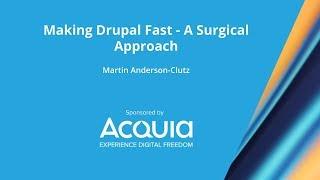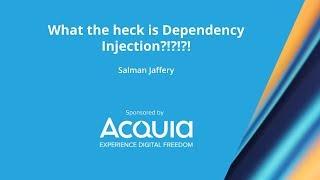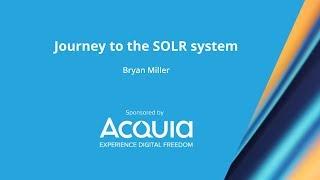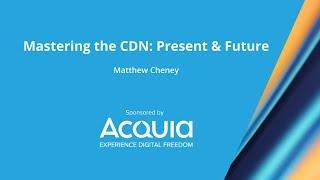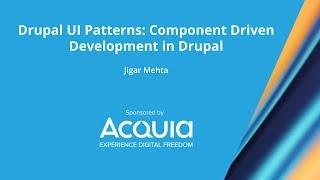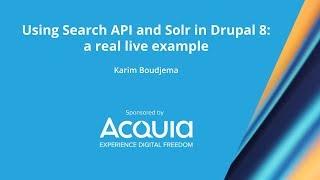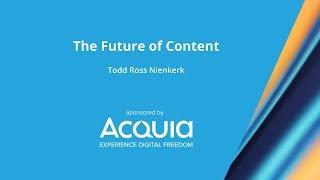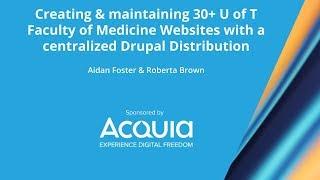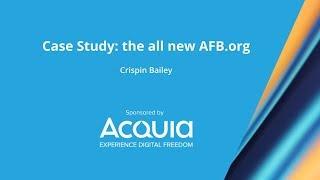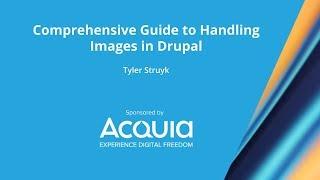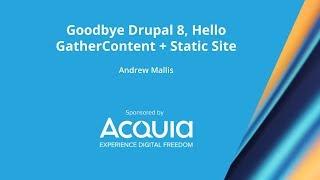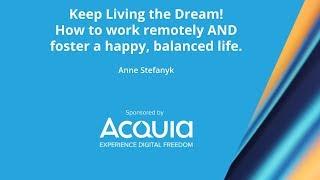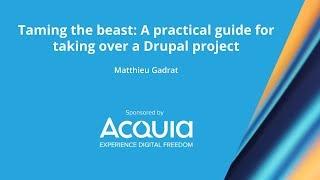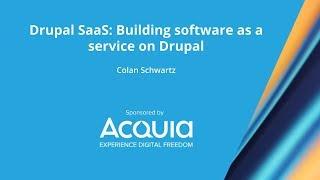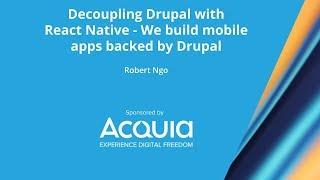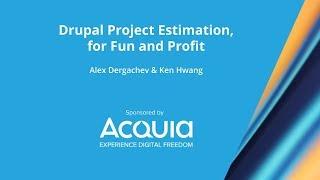Introduction
Drupal North is a three-day conference focusing on a variety of Drupal related topics and the community that drives the Drupal Project.
Video Sponsor(s) / Provided by
Curated Videos
Description
Martin Anderson-Clutz
There are lots of tools for helping you analyze the speed of your Drupal site, but how do you turn their results into actionable insights? In this session we’ll look at the results provided by WebPageTest.org, and walk through a framework for turning the provided data into a set of actions that put your effort where it will have the most impact.
Often when we see warnings about slow load times, we assume the application needs to run faster: optimize caching, increase server resources, and so on. But often such optimizations only improve a site in which the page load is only a small part of the problem. Putting your focus where it’s most needed will lead to a much faster site, and happier visitors.
The talk will cover a wide range of topics, and the approach will benefit developers with a wide range of experience, from beginner to experienced. They will learn how to turn raw performance data into actionable insights that will make their sites feel faster to visitors.
Martin Anderson-Clutz
Sales Engineer, Strategic Alliances, London
Martin began using Drupal in 2005, and later joined Digital Echidna, where he currently works as Sales Engineer, Strategic Alliances. Certified as a Drupal Grandmaster by Acquia and for UX by the Nielsen Norman Group, Martin is passionate about delivering web-based solutions that empower individuals. He was the founder of LonDUG, the Drupal users group in London, Ontario.
https://drupalnorth.org/en/session/making-drupal-fast-surgical-approach
There are lots of tools for helping you analyze the speed of your Drupal site, but how do you turn their results into actionable insights? In this session we’ll look at the results provided by WebPageTest.org, and walk through a framework for turning the provided data into a set of actions that put your effort where it will have the most impact.
Often when we see warnings about slow load times, we assume the application needs to run faster: optimize caching, increase server resources, and so on. But often such optimizations only improve a site in which the page load is only a small part of the problem. Putting your focus where it’s most needed will lead to a much faster site, and happier visitors.
The talk will cover a wide range of topics, and the approach will benefit developers with a wide range of experience, from beginner to experienced. They will learn how to turn raw performance data into actionable insights that will make their sites feel faster to visitors.
Martin Anderson-Clutz
Sales Engineer, Strategic Alliances, London
Martin began using Drupal in 2005, and later joined Digital Echidna, where he currently works as Sales Engineer, Strategic Alliances. Certified as a Drupal Grandmaster by Acquia and for UX by the Nielsen Norman Group, Martin is passionate about delivering web-based solutions that empower individuals. He was the founder of LonDUG, the Drupal users group in London, Ontario.
https://drupalnorth.org/en/session/making-drupal-fast-surgical-approach
Description
Salman Jaffery
We all must have heard about dependency injection one way or another but what the heck is it and how and why do we use it.
With Drupal 9 on the horizon, functional programming is on the way with a lot of the functions that we have come to rely biting the dust (DEPRECATED) one after another.
As such if we are to do object oriented programming properly, one topic that we must learn to understand is Dependency Injection or passing stuff into out classes and objects.
Lets explore this together and see how it works with Drupal 8.
Salman Jaffery
Senior Developer, Woodlawn, @sjpeters79
Salman is an experienced Drupal Developer working at Coldfront Labs Inc. Having started with Drupal 7 in 2014 and now working with Drupal 8 for the last two years, he's touched a lot of Drupal's core features and systems. He also runs DrupalYOW monthly meetups in Ottawa. Outside of drupal, family, social events, personal pet projects and video games occupies his time.
https://drupalnorth.org/en/session/what-heck-dependency-injection
We all must have heard about dependency injection one way or another but what the heck is it and how and why do we use it.
With Drupal 9 on the horizon, functional programming is on the way with a lot of the functions that we have come to rely biting the dust (DEPRECATED) one after another.
As such if we are to do object oriented programming properly, one topic that we must learn to understand is Dependency Injection or passing stuff into out classes and objects.
Lets explore this together and see how it works with Drupal 8.
Salman Jaffery
Senior Developer, Woodlawn, @sjpeters79
Salman is an experienced Drupal Developer working at Coldfront Labs Inc. Having started with Drupal 7 in 2014 and now working with Drupal 8 for the last two years, he's touched a lot of Drupal's core features and systems. He also runs DrupalYOW monthly meetups in Ottawa. Outside of drupal, family, social events, personal pet projects and video games occupies his time.
https://drupalnorth.org/en/session/what-heck-dependency-injection
Description
Bryan Miller
In the beginning, we searched our Drupal-based University websites using the Google Search Appliance. Until one day, the big yellow servers stopped arriving. We then embarked on a journey to replace the deprecated product with a new solution. Searching far and wide through the universe, we settled upon a solution that would integrate well with our existing multi-site Drupal installation. Join us on our tour where we will present our challenges and what made us gravitate towards a Drupal-Solr integration.
Bryan Miller
Application Manager, Ottawa
I am a Technical Project manager with the University of Ottawa’s web services team. Has been active in web development and content management systems since 2003. Championed the universities Drupal adoption project which began in 2011. Currently helping the university to work towards its next Drupal migration and to leverage other open source tools such as SOLR.
https://drupalnorth.org/en/session/journey-solr-system
In the beginning, we searched our Drupal-based University websites using the Google Search Appliance. Until one day, the big yellow servers stopped arriving. We then embarked on a journey to replace the deprecated product with a new solution. Searching far and wide through the universe, we settled upon a solution that would integrate well with our existing multi-site Drupal installation. Join us on our tour where we will present our challenges and what made us gravitate towards a Drupal-Solr integration.
Bryan Miller
Application Manager, Ottawa
I am a Technical Project manager with the University of Ottawa’s web services team. Has been active in web development and content management systems since 2003. Championed the universities Drupal adoption project which began in 2011. Currently helping the university to work towards its next Drupal migration and to leverage other open source tools such as SOLR.
https://drupalnorth.org/en/session/journey-solr-system
Description
Matthew Cheney
If you site is not running on a CDN, you are missing out. Modern websites receive enormous benefits in terms of speed & reliability when utilizing a content delivery network - and setting one up for your site has never been easier.
CDNs offer the best in class support for making websites fast utilizing techniques such as HTTPS/2 (soon HTTPS/3), image compression, global points of presence, TLS integration, cache tags (in D8 core!), & much more!
This presentation will review how a CDN works, how to integrate it into your site, and how to get the fastest and best site on the internet using other peoples servers around the world.
Matthew Cheney
Chaos Wizard, New Orleans, @populist
I help organize magical Drupal events (BADCamp, Drupalcon SF), write code to help site builders in the Panels universe (Panopoly), and founded a couple awesome Drupal companies (Chapter Three, Pantheon).
https://drupalnorth.org/en/session/mastering-cdn-present-future
If you site is not running on a CDN, you are missing out. Modern websites receive enormous benefits in terms of speed & reliability when utilizing a content delivery network - and setting one up for your site has never been easier.
CDNs offer the best in class support for making websites fast utilizing techniques such as HTTPS/2 (soon HTTPS/3), image compression, global points of presence, TLS integration, cache tags (in D8 core!), & much more!
This presentation will review how a CDN works, how to integrate it into your site, and how to get the fastest and best site on the internet using other peoples servers around the world.
Matthew Cheney
Chaos Wizard, New Orleans, @populist
I help organize magical Drupal events (BADCamp, Drupalcon SF), write code to help site builders in the Panels universe (Panopoly), and founded a couple awesome Drupal companies (Chapter Three, Pantheon).
https://drupalnorth.org/en/session/mastering-cdn-present-future
Description
Joyce Peralta
At McGill University, the amount of effort and emphasis put into UX research for web projects has grown substantially over the past few years. This has resulted in more frequent testing, a growing pool of data and increased involvement in web projects for staff and audience members alike.
The outcome of these exercises have been of direct benefit to the audiences who visit our websites and staff members responsible for building and maintaining them. But who else can benefit from these practices? Are there others who might contribute to the conversation and participate in improving user experiences?
With the understanding that there could be great payoffs in taking a more holistic approach, we’ve tried to involve more than just the usual suspects in our UX research and analysis - developers, product owners and support staff to name a few. Along the way, we’ve encountered failures and surprising successes, all the while learning from our experiences. Come hear about the benefits (and pitfalls) of making good UX a team responsibility.
Joyce Peralta
Web Analyst, Montreal, @theotherlondon
I've been creating websites and digital content for close to 20 years, including 10+ years’ experience in higher education. My work history includes positions on web development and communications teams at McGill University, the University of Victoria, Western University and Kings University College.
I currently work at McGill University in Montreal as a Web Analyst with McGill IT Communications.
https://drupalnorth.org/en/session/taking-it-next-level-strategies-making-good-ux-team-effort
At McGill University, the amount of effort and emphasis put into UX research for web projects has grown substantially over the past few years. This has resulted in more frequent testing, a growing pool of data and increased involvement in web projects for staff and audience members alike.
The outcome of these exercises have been of direct benefit to the audiences who visit our websites and staff members responsible for building and maintaining them. But who else can benefit from these practices? Are there others who might contribute to the conversation and participate in improving user experiences?
With the understanding that there could be great payoffs in taking a more holistic approach, we’ve tried to involve more than just the usual suspects in our UX research and analysis - developers, product owners and support staff to name a few. Along the way, we’ve encountered failures and surprising successes, all the while learning from our experiences. Come hear about the benefits (and pitfalls) of making good UX a team responsibility.
Joyce Peralta
Web Analyst, Montreal, @theotherlondon
I've been creating websites and digital content for close to 20 years, including 10+ years’ experience in higher education. My work history includes positions on web development and communications teams at McGill University, the University of Victoria, Western University and Kings University College.
I currently work at McGill University in Montreal as a Web Analyst with McGill IT Communications.
https://drupalnorth.org/en/session/taking-it-next-level-strategies-making-good-ux-team-effort
Description
Andrew Lindsay
This might sound familiar: you have a highly productive Agile development team. Your organization has a wealth of stakeholders with competing interests. Your ScrumMaster and your Product Owner keep things rolling smoothly day-to-day but things tend to fall apart when it comes to longer term strategic discussions and release planning with respect to the needs of stakeholder X vs stakeholder Y.
Join me for a discussion of effective strategies that can be employed to turn difficult competitive planning sessions into productive and collaborative release planning adventures! Let's fire up the fun machine and work it all out together--everybody wins when we play the 100 dollar game and some business value poker.
Andrew Lindsay
VP of Product, Montreal, @mirabuck
Technologist and process wonk specializing in team building and development that supports progressive online activism. Currently VP of product at New/Mode. Previosly at The Linux Foundation, Open Media and McGill University.
https://drupalnorth.org/en/session/collaboration-game-time-tested-techniques-agile-release-planning
This might sound familiar: you have a highly productive Agile development team. Your organization has a wealth of stakeholders with competing interests. Your ScrumMaster and your Product Owner keep things rolling smoothly day-to-day but things tend to fall apart when it comes to longer term strategic discussions and release planning with respect to the needs of stakeholder X vs stakeholder Y.
Join me for a discussion of effective strategies that can be employed to turn difficult competitive planning sessions into productive and collaborative release planning adventures! Let's fire up the fun machine and work it all out together--everybody wins when we play the 100 dollar game and some business value poker.
Andrew Lindsay
VP of Product, Montreal, @mirabuck
Technologist and process wonk specializing in team building and development that supports progressive online activism. Currently VP of product at New/Mode. Previosly at The Linux Foundation, Open Media and McGill University.
https://drupalnorth.org/en/session/collaboration-game-time-tested-techniques-agile-release-planning
Description
Joyce Peralta and Matt Corks
Drupal is used extensively at McGill University; a team of 10 manages a platform used by 1,700 active site managers to power 10 million page views per month on the website ranked # 115 in all of Canada by Alexa. This is achieved via a shared Drupal multisite architecture, automated deployment and provisioning scripts, dedicated and responsive support staff, extensive internal training and documentation efforts, and an Agile workflow. This session will cover the project's goals, scope, history, architecture, staffing, user base, planning, training, documentation, and challenges, and will be presented by Joyce Peralta, a web analyst and UX specialist, and Matt Corks, a back-end web developer.
Matt Corks
Senior Web Developer/Analyst, Montreal, @mvc447
I'm a developer and project manager who has specialized in Drupal since 2005. I've contributed to the Drupal community by giving presentations and contributing patches for many years. I've worked as a developer on web sites for a wide variety of corporate, institutional, and non-profit clients. Prior to joining McGill IT Services in 2017, I built Drupal sites for Evolving Web, the Linux Foundation, the federal New Democratic Party of Canada, and two consulting agencies specializing in work with the non-profit sector.
https://drupalnorth.org/en/session/case-study-how-why-drupal-powers-900-websites-mcgill
Drupal is used extensively at McGill University; a team of 10 manages a platform used by 1,700 active site managers to power 10 million page views per month on the website ranked # 115 in all of Canada by Alexa. This is achieved via a shared Drupal multisite architecture, automated deployment and provisioning scripts, dedicated and responsive support staff, extensive internal training and documentation efforts, and an Agile workflow. This session will cover the project's goals, scope, history, architecture, staffing, user base, planning, training, documentation, and challenges, and will be presented by Joyce Peralta, a web analyst and UX specialist, and Matt Corks, a back-end web developer.
Matt Corks
Senior Web Developer/Analyst, Montreal, @mvc447
I'm a developer and project manager who has specialized in Drupal since 2005. I've contributed to the Drupal community by giving presentations and contributing patches for many years. I've worked as a developer on web sites for a wide variety of corporate, institutional, and non-profit clients. Prior to joining McGill IT Services in 2017, I built Drupal sites for Evolving Web, the Linux Foundation, the federal New Democratic Party of Canada, and two consulting agencies specializing in work with the non-profit sector.
https://drupalnorth.org/en/session/case-study-how-why-drupal-powers-900-websites-mcgill
Description
Jigar Mehta
Have you written the same code twice while theming a Drupal website? Learn how to build a site with easily reusable components using the UI Patterns module. Such component-based software development results in faster development cycles because you build each component only once. This means your company makes more profit and your developers always go home on time!
We'll talk about:
Component-based Software Engineering
Introduction to the UI Patterns module
Creating UI Patterns
Using UI Patterns with Display Suite
Using UI Patterns with Views
Using UI Patterns with Field Groups
Using UI Patterns with code
Jigar Mehta
Senior Developer, Montréal, @jigarius
I am a full-stack PHP developer since 2009 and I am experienced with planning and developing large-scale dynamic web applications in *AMP environments. I started full-stack Drupal development in 2013 and I've been working on Drupal since then.
In addition to the above, I have thorough knowledge of HTML, CSS, JavaScript, jQuery, PHP and some basic knowledge of PrestaShop, Laravel and Code Igniter. I am also at good terms with the Adobe Creativity Suite and I love to work in Agile environments. Currently, I am learning Python and Ruby.
Specialties: PHP, Drupal, HTML, CSS and JavaScript / jQuery.
https://drupalnorth.org/en/session/drupal-ui-patterns-component-driven-development-drupal
Have you written the same code twice while theming a Drupal website? Learn how to build a site with easily reusable components using the UI Patterns module. Such component-based software development results in faster development cycles because you build each component only once. This means your company makes more profit and your developers always go home on time!
We'll talk about:
Component-based Software Engineering
Introduction to the UI Patterns module
Creating UI Patterns
Using UI Patterns with Display Suite
Using UI Patterns with Views
Using UI Patterns with Field Groups
Using UI Patterns with code
Jigar Mehta
Senior Developer, Montréal, @jigarius
I am a full-stack PHP developer since 2009 and I am experienced with planning and developing large-scale dynamic web applications in *AMP environments. I started full-stack Drupal development in 2013 and I've been working on Drupal since then.
In addition to the above, I have thorough knowledge of HTML, CSS, JavaScript, jQuery, PHP and some basic knowledge of PrestaShop, Laravel and Code Igniter. I am also at good terms with the Adobe Creativity Suite and I love to work in Agile environments. Currently, I am learning Python and Ruby.
Specialties: PHP, Drupal, HTML, CSS and JavaScript / jQuery.
https://drupalnorth.org/en/session/drupal-ui-patterns-component-driven-development-drupal
Description
Karim Boudjema
Today, search and performance are a key factor of success for any kind of website.
Search is important because, for many users, it is the quickest way to find the content that they're looking for, especially when our site covers multiple subjects.
Performance is just as vital when we offer searching in a large dataset of content and in larges sites with multiple authenticated users.
In this session we will talk about how we used Apache Solr as a search and views backend in a real live example: videodrupal.org, a new community website with more than 3 000 drupal videos that aims to be a central point to quickly find Drupal videos and help new comers or advanced Drupal users to learn Drupal smoothly and effortlessly.
Through this example, we will also learn step by step how we implemented a “More Like This” block with Solr.
Karim Boudjema
Drupal Developer / Drupal Trainer, Cochabamba / Bolivia, @karimboudjema
Hello, my name is Karim Boudjema, I'm the developer and maintainer of VideoDrupal.org
I’m a Belgian Drupal developer and business specialist living in Cochabamba - Bolivia.
When I discovered Drupal 4.7 back in 2008 (yes, 10 years ago), I realized that it would be a game changing technology in the digital world. And it was! But Drupal has not only changed our ability to build incredible digital experiences, it has also changed my life and the way I do my work on a day to day basis. It has allowed me to become part of the larger global Drupal community, which has been an incredible personal and professional experience.
Most of my work has been focused on the media industry, I’ve developed large Drupal websites such as major newspapers sites or marketplaces with hundreds of thousands of nodes and millions of visitors each month.
I'm also an attentive university professor with excellent communication and pedagogic skills. That's why I use effective and efficient methods of teaching Drupal for beginners and advanced users, and I really love it!
Finally, as a Drupal Evangelist, I co-organized several DrupalCamps in South America like Peru, Bolivia, Mexico and Panama. I co-founded the Drupal Community in Bolivia.
What do I love?
My wife and my two kids who support me in this journey
The Drupal Community
Teaching and evangelize Drupal
Traveling
Listening to jazz, heavy metal and French pop songs (What a mix!!!)
Hiking in the surrounding Andean mountains
Developing NGO Drupal websites on a a pro-bono basis to support causes I value
More info on my Drupal blog: http://karimboudjema.com/
https://drupalnorth.org/en/session/using-search-api-and-solr-drupal-8-real-live-example
Today, search and performance are a key factor of success for any kind of website.
Search is important because, for many users, it is the quickest way to find the content that they're looking for, especially when our site covers multiple subjects.
Performance is just as vital when we offer searching in a large dataset of content and in larges sites with multiple authenticated users.
In this session we will talk about how we used Apache Solr as a search and views backend in a real live example: videodrupal.org, a new community website with more than 3 000 drupal videos that aims to be a central point to quickly find Drupal videos and help new comers or advanced Drupal users to learn Drupal smoothly and effortlessly.
Through this example, we will also learn step by step how we implemented a “More Like This” block with Solr.
Karim Boudjema
Drupal Developer / Drupal Trainer, Cochabamba / Bolivia, @karimboudjema
Hello, my name is Karim Boudjema, I'm the developer and maintainer of VideoDrupal.org
I’m a Belgian Drupal developer and business specialist living in Cochabamba - Bolivia.
When I discovered Drupal 4.7 back in 2008 (yes, 10 years ago), I realized that it would be a game changing technology in the digital world. And it was! But Drupal has not only changed our ability to build incredible digital experiences, it has also changed my life and the way I do my work on a day to day basis. It has allowed me to become part of the larger global Drupal community, which has been an incredible personal and professional experience.
Most of my work has been focused on the media industry, I’ve developed large Drupal websites such as major newspapers sites or marketplaces with hundreds of thousands of nodes and millions of visitors each month.
I'm also an attentive university professor with excellent communication and pedagogic skills. That's why I use effective and efficient methods of teaching Drupal for beginners and advanced users, and I really love it!
Finally, as a Drupal Evangelist, I co-organized several DrupalCamps in South America like Peru, Bolivia, Mexico and Panama. I co-founded the Drupal Community in Bolivia.
What do I love?
My wife and my two kids who support me in this journey
The Drupal Community
Teaching and evangelize Drupal
Traveling
Listening to jazz, heavy metal and French pop songs (What a mix!!!)
Hiking in the surrounding Andean mountains
Developing NGO Drupal websites on a a pro-bono basis to support causes I value
More info on my Drupal blog: http://karimboudjema.com/
https://drupalnorth.org/en/session/using-search-api-and-solr-drupal-8-real-live-example
Description
David Pascoe-Deslauriers and Philippe Thiboutot-Simard
This is a case study for an application built in Drupal to support Statistics Canada's Real Time Remote Access (RTRA) system.
We'll talk about:
UX design for very complex workflows
Building highly interactive decoupled Drupal Applications with VueJS
Leveraging Drupal 8 and Migrate to build data services
Compiler and programming language design
Statistical programming and SAS
RTRA is a system for external groups to run custom statistical programs against Statcan data with them having access to the data directly and while protecting privacy. However, these programs must be written using a proprietary programming language called SAS, while consult with several pieces of documentation to figure out what data is available and when and what restrictions and features are in-place specifically in the RTRA system. Suffice to say, the barrier to entry for using this system is high.
A long proposed solution was to build a graphical programming system to help new users who may not know SAS write working programs, but this was considered impossible or at least infeasible to actually develop . . .
We built a graphical programming system for people unfamiliar with SAS to write SAS applications in a system that combines program development with the various RTRA and data documentation.
We'll talk about what we developed, how we developed it, and why we made the decisions we did.
If you go to just one talk about SAS programming this year, make it this one.
https://drupalnorth.org/en/session/building-impossible-applications-drupal-and-vuejs
This is a case study for an application built in Drupal to support Statistics Canada's Real Time Remote Access (RTRA) system.
We'll talk about:
UX design for very complex workflows
Building highly interactive decoupled Drupal Applications with VueJS
Leveraging Drupal 8 and Migrate to build data services
Compiler and programming language design
Statistical programming and SAS
RTRA is a system for external groups to run custom statistical programs against Statcan data with them having access to the data directly and while protecting privacy. However, these programs must be written using a proprietary programming language called SAS, while consult with several pieces of documentation to figure out what data is available and when and what restrictions and features are in-place specifically in the RTRA system. Suffice to say, the barrier to entry for using this system is high.
A long proposed solution was to build a graphical programming system to help new users who may not know SAS write working programs, but this was considered impossible or at least infeasible to actually develop . . .
We built a graphical programming system for people unfamiliar with SAS to write SAS applications in a system that combines program development with the various RTRA and data documentation.
We'll talk about what we developed, how we developed it, and why we made the decisions we did.
If you go to just one talk about SAS programming this year, make it this one.
https://drupalnorth.org/en/session/building-impossible-applications-drupal-and-vuejs
Description
Danielle Lyrette & David Pascoe-Deslauriers
While we obsess about UX, time and budget are rarely spent on AX--the authoring experience. In this talk, we’ll cover content strategy 101 and how to integrate your content style guide into the Drupal authoring experience.
This talk is for developers, content strategists, project managers, and anyone who loves 90s ska bands.
Danielle Lyrette
Content Strategist , Ottawa, @mslyrette
A lover of words, Danielle is a proficient communicator, an assiduous organizer, and a creative-spirit at heart.
https://drupalnorth.org/en/session/why-cant-we-be-friends-configuring-drupal-play-nice-content-authors
While we obsess about UX, time and budget are rarely spent on AX--the authoring experience. In this talk, we’ll cover content strategy 101 and how to integrate your content style guide into the Drupal authoring experience.
This talk is for developers, content strategists, project managers, and anyone who loves 90s ska bands.
Danielle Lyrette
Content Strategist , Ottawa, @mslyrette
A lover of words, Danielle is a proficient communicator, an assiduous organizer, and a creative-spirit at heart.
https://drupalnorth.org/en/session/why-cant-we-be-friends-configuring-drupal-play-nice-content-authors
Description
Todd Ross Nienkerk
Learn how publishers, universities, media companies, and nonprofits are thriving by adopting platforms built for the future of content. He will discuss centralized content management, context-aware content, multichannel and omnichannel publishing, decoupling your CMS and future-proofing your project.
Todd Ross Nienkerk, CEO and Co‑Founder of Four Kitchens
Todd has been involved in the web design and publishing industries since 1996. He has designed and built countless websites and written for, edited, and managed several digital and print publications. His background in design, development, communication, and psychology provides him with unique insight into how people interact with technology, information, and each other.
Todd co-founded Four Kitchens in 2006, and the Web Chefs have been making BIG websites ever since. As CEO, he guides Four Kitchens’ vision, culture, and long-term strategy. He believes the most effective leaders hire people smarter and better than themselves—as every Web Chef demonstrates on a daily basis.
Outside of Four Kitchens, Todd is a member of various boards and advisory councils, including I Live Here, I Give Here, one of Austin, Texas’ largest nonprofit giving communities.
https://drupalnorth.org/en/keynote-speaker
Learn how publishers, universities, media companies, and nonprofits are thriving by adopting platforms built for the future of content. He will discuss centralized content management, context-aware content, multichannel and omnichannel publishing, decoupling your CMS and future-proofing your project.
Todd Ross Nienkerk, CEO and Co‑Founder of Four Kitchens
Todd has been involved in the web design and publishing industries since 1996. He has designed and built countless websites and written for, edited, and managed several digital and print publications. His background in design, development, communication, and psychology provides him with unique insight into how people interact with technology, information, and each other.
Todd co-founded Four Kitchens in 2006, and the Web Chefs have been making BIG websites ever since. As CEO, he guides Four Kitchens’ vision, culture, and long-term strategy. He believes the most effective leaders hire people smarter and better than themselves—as every Web Chef demonstrates on a daily basis.
Outside of Four Kitchens, Todd is a member of various boards and advisory councils, including I Live Here, I Give Here, one of Austin, Texas’ largest nonprofit giving communities.
https://drupalnorth.org/en/keynote-speaker
Description
Aidan Foster & Roberta Brown
This session is a business case study reviewing the benefits, challenges, and lessons learned when we created the custom Drupal distribution “WebPac” that manages 30 websites from a common code base. The presentation will provide a broad overview of both the business, strategic, technical, and infrastructure used by the Faculty of Medicine.
Roberta will focus on the client side operations, on-boarding new clients to the platform, and supporting the end-user content editors. Aidan will review the technical architecture of the platform, the hosting environment, and briefly outline the processes and technologies used to ensure ongoing security updates. He will review how new features are deployed to the sites and minimize the risk of bugs accessibility problems on the platform.
Aidan Foster
Front end architect, UX Designer, TORONTO, @finteractive
Aidan is a UX designer and Front-end architect. He started his first website design business a month after graduating in 2002, and it remains successful today. Aidan is a tiny bit obsessive about process (in a good way). He focuses on using tools and processes to improve the quality of both design and code, all while creating a more efficient and sustainable workflow.
Aidan is the President of the Drupal Toronto and core organizer for Drupal North.
https://drupalnorth.org/en/session/business-case-study-creating-maintaining-30-u-t-faculty-medicine-websites-centralized
This session is a business case study reviewing the benefits, challenges, and lessons learned when we created the custom Drupal distribution “WebPac” that manages 30 websites from a common code base. The presentation will provide a broad overview of both the business, strategic, technical, and infrastructure used by the Faculty of Medicine.
Roberta will focus on the client side operations, on-boarding new clients to the platform, and supporting the end-user content editors. Aidan will review the technical architecture of the platform, the hosting environment, and briefly outline the processes and technologies used to ensure ongoing security updates. He will review how new features are deployed to the sites and minimize the risk of bugs accessibility problems on the platform.
Aidan Foster
Front end architect, UX Designer, TORONTO, @finteractive
Aidan is a UX designer and Front-end architect. He started his first website design business a month after graduating in 2002, and it remains successful today. Aidan is a tiny bit obsessive about process (in a good way). He focuses on using tools and processes to improve the quality of both design and code, all while creating a more efficient and sustainable workflow.
Aidan is the President of the Drupal Toronto and core organizer for Drupal North.
https://drupalnorth.org/en/session/business-case-study-creating-maintaining-30-u-t-faculty-medicine-websites-centralized
Description
Crispin Bailey
The American Foundation for the Blind (AFB) recently underwent a major shift in strategic direction, and by coincidence, it was also time to revamp their website. They had a capable in-house dev team, but needed help with content strategy, UX, and front-end design. This talk will cover the process we went through to overhaul the site's messaging, content architecture, and visual design, culminating in a fully-responsive HTML prototype and Style Guide that was used to implement a brand new, fully-accessible, Drupal 8 website.
Takeaways from this talk:
How to design for accessibility;
How to design a website for an org undergoing change;
How to collaborate with a remote team including people who are blind or have low vision;
How to redesign a website that another team will implement.
https://drupalnorth.org/en/session/case-study-all-new-afborg
The American Foundation for the Blind (AFB) recently underwent a major shift in strategic direction, and by coincidence, it was also time to revamp their website. They had a capable in-house dev team, but needed help with content strategy, UX, and front-end design. This talk will cover the process we went through to overhaul the site's messaging, content architecture, and visual design, culminating in a fully-responsive HTML prototype and Style Guide that was used to implement a brand new, fully-accessible, Drupal 8 website.
Takeaways from this talk:
How to design for accessibility;
How to design a website for an org undergoing change;
How to collaborate with a remote team including people who are blind or have low vision;
How to redesign a website that another team will implement.
https://drupalnorth.org/en/session/case-study-all-new-afborg
Description
Christopher Gervais
Delivering working features based on vague project specifications can be fraught with pitfalls. How do you ensure a shared understanding between stakeholders of wildly varying subject-matter expertise and technical skills? How do you stay on the critical path, delivering incremental value and properly prioritizing when faced with conflicting mandates? How do you demonstrate that you've satisfied the original requirements after all that?
We'll cover how to set up a project for success with:
Behaviour-Driven Development using Behat
Agile project management on GitLab
Project documentation in Hugo
Christopher Gervais
Pointe-Claire
I have presented at numerous Drupal-related conferences and events, including, Camps, Summits and DrupalCon Europe.
https://drupalnorth.org/en/session/delivering-specifications
Delivering working features based on vague project specifications can be fraught with pitfalls. How do you ensure a shared understanding between stakeholders of wildly varying subject-matter expertise and technical skills? How do you stay on the critical path, delivering incremental value and properly prioritizing when faced with conflicting mandates? How do you demonstrate that you've satisfied the original requirements after all that?
We'll cover how to set up a project for success with:
Behaviour-Driven Development using Behat
Agile project management on GitLab
Project documentation in Hugo
Christopher Gervais
Pointe-Claire
I have presented at numerous Drupal-related conferences and events, including, Camps, Summits and DrupalCon Europe.
https://drupalnorth.org/en/session/delivering-specifications
Description
Matt Corks
Drupal North encourages talks by people who are new to speaking, and those from under-represented communities. We can’t make software which serves the needs of our entire society without participation from as diverse a group as possible, and presenting at a conference is a great way both to contribute to the Drupal community and to show others that it includes people like you.
Speaking in front of a large group of people for the first time is hard for most people, but since it is a learned skill almost anyone who has the time can master how to do this, and the same is true for structuring technical content in a way that’s accessible and useful for your audience. As someone who’s been giving presentations on Drupal since 2009, I’m eager to share what I’ve figured out so far about how to do so, in order to encourage others to take their turn on stage.
Topics to be covered:
Why it’s important to include people from many different backgrounds in the Drupal community
How to become more comfortable with public speaking
How to give a great technical presentation
Bonus: bring a draft conference proposal or slide deck -- with your permission, and if time allows, I will do a live review and offer constructive feedback! I'm also willing to do this privately with you after this session.
Slides: http://bit.ly/presentation-howto
Matt Corks
Senior Web Developer/Analyst, Montreal, @mvc447
I'm a developer and project manager who has specialized in Drupal since 2005. I've contributed to the Drupal community by giving presentations and contributing patches for many years. I've worked as a developer on web sites for a wide variety of corporate, institutional, and non-profit clients. Prior to joining McGill IT Services in 2017, I built Drupal sites for Evolving Web, the Linux Foundation, the federal New Democratic Party of Canada, and two consulting agencies specializing in work with the non-profit sector.
https://drupalnorth.org/en/session/meta-talk-how-give-your-first-conference-presentation-and-why-you-should
Drupal North encourages talks by people who are new to speaking, and those from under-represented communities. We can’t make software which serves the needs of our entire society without participation from as diverse a group as possible, and presenting at a conference is a great way both to contribute to the Drupal community and to show others that it includes people like you.
Speaking in front of a large group of people for the first time is hard for most people, but since it is a learned skill almost anyone who has the time can master how to do this, and the same is true for structuring technical content in a way that’s accessible and useful for your audience. As someone who’s been giving presentations on Drupal since 2009, I’m eager to share what I’ve figured out so far about how to do so, in order to encourage others to take their turn on stage.
Topics to be covered:
Why it’s important to include people from many different backgrounds in the Drupal community
How to become more comfortable with public speaking
How to give a great technical presentation
Bonus: bring a draft conference proposal or slide deck -- with your permission, and if time allows, I will do a live review and offer constructive feedback! I'm also willing to do this privately with you after this session.
Slides: http://bit.ly/presentation-howto
Matt Corks
Senior Web Developer/Analyst, Montreal, @mvc447
I'm a developer and project manager who has specialized in Drupal since 2005. I've contributed to the Drupal community by giving presentations and contributing patches for many years. I've worked as a developer on web sites for a wide variety of corporate, institutional, and non-profit clients. Prior to joining McGill IT Services in 2017, I built Drupal sites for Evolving Web, the Linux Foundation, the federal New Democratic Party of Canada, and two consulting agencies specializing in work with the non-profit sector.
https://drupalnorth.org/en/session/meta-talk-how-give-your-first-conference-presentation-and-why-you-should
Description
Andrew Mallis
I was a self-taught Google Analytics user. I thought I was getting by OK.
But, since working with professional analysts, I’ve seen how my data wasn’t as complete or accurate as I thought I was. And with bad data, it’s easy to tell the wrong story.
Now, I’m here to level you up, and share best practices for setting up your Google Analytics accounts.
In this talk, we will:
provide recommendations on best practices for setting up your views, filters, and goals
explain the connection between users, sessions and pageviews
look at the power of Search Console for unlocking SEO insights
outline strategies for UTM link generation and recording
demystify (and devalue) bounce rates
show how to improve the accuracy of your referral traffic
point to how GTM can be used to unleash features like video tracking, heatmapping, and more
Demonstrate how you can debug GA tracking in real-time
and more!
Attendees will walk away with a handy and concise 3-page guide to take them from basecamp to summit.
https://drupalnorth.org/en/session/google-analytics-201
I was a self-taught Google Analytics user. I thought I was getting by OK.
But, since working with professional analysts, I’ve seen how my data wasn’t as complete or accurate as I thought I was. And with bad data, it’s easy to tell the wrong story.
Now, I’m here to level you up, and share best practices for setting up your Google Analytics accounts.
In this talk, we will:
provide recommendations on best practices for setting up your views, filters, and goals
explain the connection between users, sessions and pageviews
look at the power of Search Console for unlocking SEO insights
outline strategies for UTM link generation and recording
demystify (and devalue) bounce rates
show how to improve the accuracy of your referral traffic
point to how GTM can be used to unleash features like video tracking, heatmapping, and more
Demonstrate how you can debug GA tracking in real-time
and more!
Attendees will walk away with a handy and concise 3-page guide to take them from basecamp to summit.
https://drupalnorth.org/en/session/google-analytics-201
Description
Maxime Gauthier-Kwan
Most web shops have similar challenges: tight deadlines, wrangling contributors, poor communication, staying up to date with the digital evolution, improving user experience, all while trying to defend best practices.
I hope to equip you with a fresh perspective that draws from business principles. The goal is to improve your productivity while also giving you tips to remain sane in an ever more convoluted digital environment.
Target audience
Strategy focused
All web practitioner
No coding knowledge required
Themes
Business principles for web content practitioner
Communicating like leadership
Team management and people skills
Focus on self - Introspection of a content practitioner
Energy and stress management
Maxime Gauthier-Kwan
Strategist, Web Content Management and Design , Ottawa, @MaximeGK
During the day, Maxime is a Strategist in Web Content Management and Design. He also has a background in marketing. He enjoys bridging the gaps between business, technology and design. He is an interdisciplinary technical and creative generalist. Maxime is a full-stack content professional (strategy/IA/generation/design/implementation/renewal).
https://drupalnorth.org/en/session/empowering-content-managers-using-business-principles
Most web shops have similar challenges: tight deadlines, wrangling contributors, poor communication, staying up to date with the digital evolution, improving user experience, all while trying to defend best practices.
I hope to equip you with a fresh perspective that draws from business principles. The goal is to improve your productivity while also giving you tips to remain sane in an ever more convoluted digital environment.
Target audience
Strategy focused
All web practitioner
No coding knowledge required
Themes
Business principles for web content practitioner
Communicating like leadership
Team management and people skills
Focus on self - Introspection of a content practitioner
Energy and stress management
Maxime Gauthier-Kwan
Strategist, Web Content Management and Design , Ottawa, @MaximeGK
During the day, Maxime is a Strategist in Web Content Management and Design. He also has a background in marketing. He enjoys bridging the gaps between business, technology and design. He is an interdisciplinary technical and creative generalist. Maxime is a full-stack content professional (strategy/IA/generation/design/implementation/renewal).
https://drupalnorth.org/en/session/empowering-content-managers-using-business-principles
Description
Mathieu Helie
Object-oriented programming offers a powerful abstraction over databases, abstracting their tables into collections of objects with simple, powerful interfaces. This is called an Object-Relational Mapping (or ORM), and is at the heart of modern frameworks such as Rails, Laravel and Symfony.
Drupal’s content model consists of documents of fields instead of single tables, and the basic ORM paradigm needs an extra layer of interfaces to bridge the gap. In Drupal 8 these interfaces are called TypedData and EntityQuery.
In this session we will seek to understand how to work with entity objects in Drupal 8, what the different APIs, plugins, and services do for us, and wrap it up by writing a custom module that generates a complex page layout from a Node entity.
Developers new to Drupal will take away an understanding of what happens behind the scenes when data is accessed and written in entities.
Intermediate developers will understand how to customize the field system to create clean data models that don’t require subentities such as paragraphs or hacky “Helper” objects.
Advanced developers will be introduced to concepts such a serialization and deserialization of entities.
Mathieu Helie
Consulting Developer, Montreal, @mathieuhelie
Drupal developer since 2008, I have worked on a vast diversity of site builds, platform designs, migrations and maintenance disaster recovery for private clients, agencies and enterprise Drupal users. In my free time, I am a backyard complexity theorist and enjoy baking and gardening.
https://drupalnorth.org/en/session/fieldable-entities-typeddata-and-datadefinitions-how-work-drupal-orm
Object-oriented programming offers a powerful abstraction over databases, abstracting their tables into collections of objects with simple, powerful interfaces. This is called an Object-Relational Mapping (or ORM), and is at the heart of modern frameworks such as Rails, Laravel and Symfony.
Drupal’s content model consists of documents of fields instead of single tables, and the basic ORM paradigm needs an extra layer of interfaces to bridge the gap. In Drupal 8 these interfaces are called TypedData and EntityQuery.
In this session we will seek to understand how to work with entity objects in Drupal 8, what the different APIs, plugins, and services do for us, and wrap it up by writing a custom module that generates a complex page layout from a Node entity.
Developers new to Drupal will take away an understanding of what happens behind the scenes when data is accessed and written in entities.
Intermediate developers will understand how to customize the field system to create clean data models that don’t require subentities such as paragraphs or hacky “Helper” objects.
Advanced developers will be introduced to concepts such a serialization and deserialization of entities.
Mathieu Helie
Consulting Developer, Montreal, @mathieuhelie
Drupal developer since 2008, I have worked on a vast diversity of site builds, platform designs, migrations and maintenance disaster recovery for private clients, agencies and enterprise Drupal users. In my free time, I am a backyard complexity theorist and enjoy baking and gardening.
https://drupalnorth.org/en/session/fieldable-entities-typeddata-and-datadefinitions-how-work-drupal-orm
Description
Mike Gifford
As Dries just outlined in his article Adding support for Dark Mode to web applications, we are going to have to spend more time thinking about user preferences. People are discussing adoption of new CSS media query like prefers-color-scheme or prefers-reduced-motion into our designs. These are just some of the preferences that people could start using in their designs.
We recently began adding a Preferences Framework that allows users to specify a great many things about how content is presented. Font size, color schemes, line spacing, font, even a table of contents. This gives users many ways to make your content more consumable.
The web is evolving where people want to be able to identify their preferences for content. They also want that preference follow them around on the web. Many accessibility experts are now focusing on an accessible core theme that allows users to change to meet their individual needs. Sadly there is no single solution which provides universal accessibility.
This will be a high-level presentation, but having some knowledge of CSS will be useful.
Attendees will be able to walk away with:
Strategies for dealing with prefers-color-scheme and prefers-reduced-motion designs
More information about the Drupal implementation of the Fluid UI's Preferences Framework
A better sense of how different user needs can often conflict with each other
Mike Gifford
Founder & CEO, Ottawa, @mgifford
Mike Gifford is the Founder and President of OpenConcept Consulting Inc., a web development agency specializing in the Drupal CMS. OpenConcept is a Certified B Corporation (B Corp) and works ensure that we have a positive impact on the our clients, our people, our community and the world that we live in. The company has nearly 20 years of experience in developing open source solutions that are secure, scalable, inclusive and sustainable.
Pushed by a desire to build better and more inclusive software, Mike has been involved with accessibility since the beginning of the 90s. He has spearheaded accessibility improvements in Drupal since 2008, and officially became a Drupal Core Accessibility Maintainer in 2012. Mike also wrote a Drupal Security Best Practices to highlight approaches some of the best practices in securing your site. Mike is a co-founder of Civic Tech Ottawa, a community of inviduals who are working for more open and engaged participation between citizens and governments. Using innovative technology, policy and design solutions, citizens can work with their governments to help better shape their communities. He has been been involved in engaging with federal, provincial and municipal governments to adopt more open source, and open standards approaches and encourage broader understanding of open government.
https://drupalnorth.org/en/session/personalization-and-building-accessible-site
As Dries just outlined in his article Adding support for Dark Mode to web applications, we are going to have to spend more time thinking about user preferences. People are discussing adoption of new CSS media query like prefers-color-scheme or prefers-reduced-motion into our designs. These are just some of the preferences that people could start using in their designs.
We recently began adding a Preferences Framework that allows users to specify a great many things about how content is presented. Font size, color schemes, line spacing, font, even a table of contents. This gives users many ways to make your content more consumable.
The web is evolving where people want to be able to identify their preferences for content. They also want that preference follow them around on the web. Many accessibility experts are now focusing on an accessible core theme that allows users to change to meet their individual needs. Sadly there is no single solution which provides universal accessibility.
This will be a high-level presentation, but having some knowledge of CSS will be useful.
Attendees will be able to walk away with:
Strategies for dealing with prefers-color-scheme and prefers-reduced-motion designs
More information about the Drupal implementation of the Fluid UI's Preferences Framework
A better sense of how different user needs can often conflict with each other
Mike Gifford
Founder & CEO, Ottawa, @mgifford
Mike Gifford is the Founder and President of OpenConcept Consulting Inc., a web development agency specializing in the Drupal CMS. OpenConcept is a Certified B Corporation (B Corp) and works ensure that we have a positive impact on the our clients, our people, our community and the world that we live in. The company has nearly 20 years of experience in developing open source solutions that are secure, scalable, inclusive and sustainable.
Pushed by a desire to build better and more inclusive software, Mike has been involved with accessibility since the beginning of the 90s. He has spearheaded accessibility improvements in Drupal since 2008, and officially became a Drupal Core Accessibility Maintainer in 2012. Mike also wrote a Drupal Security Best Practices to highlight approaches some of the best practices in securing your site. Mike is a co-founder of Civic Tech Ottawa, a community of inviduals who are working for more open and engaged participation between citizens and governments. Using innovative technology, policy and design solutions, citizens can work with their governments to help better shape their communities. He has been been involved in engaging with federal, provincial and municipal governments to adopt more open source, and open standards approaches and encourage broader understanding of open government.
https://drupalnorth.org/en/session/personalization-and-building-accessible-site
Description
Tyler Struyk
This presentation will try to explore all of the ways to display images to end users. It will show how developers and front-end designers can empower content creators to have full control of their images.
We will start off with simple topics like creating responsive images in Drupal 8 and choosing between using image fields or adding images through a WYSIWYG editor. We will also look at how simple adding an image is with the new Layout Builder in Drupal 8.7.0.
The majority of the presentation will focus on advanced topics, such as:
Responsive vs. adaptive design. Demo: creating a banner that scales responsively vs an adaptive design with a fixed width.
Then we will get into greater detail for front-end designers of how to make an adaptive image look good at different widths.
Basic editorial control of responsive images. Demo: taking an image of 3 people and ensuring that the “president of the company” never gets cut off when the image is cropped for various breakpoints.
Advanced editorial control of responsive images. Demo: walking through the lengthy process of giving the content editor the ability to control exactly what the image will look like at every breakpoint.
What level of knowledge should attendees have before walking into your session?
None
Who is this session for and what will attendees walk away having learned?
Content Editors - all of the ways they could ever want their images to be displayed
Developers and Site-builders - comprehensive knowledge of all the tools and modules they will need to empower their content editors
Front-end Developer - tips and tricks for handling images on the front-end, such as using overlays
Tyler Struyk
Drupal Developer, Waterloo, @iStryker
Since 2007, Tyler Struyk has specialized strictly in Drupal and PHP. He is an active module maintainer and contributor to the Drupal Project. He prides himself on being an expert in almost all aspects of Drupal, including theming, designing and customizing modules. 7 Years ago, Tyler began working with the University of Waterloo. Since then he has developed many new and innovative projects that have changed the way their content management systems work.
https://drupalnorth.org/en/session/comprehensive-guide-handling-images-drupal
This presentation will try to explore all of the ways to display images to end users. It will show how developers and front-end designers can empower content creators to have full control of their images.
We will start off with simple topics like creating responsive images in Drupal 8 and choosing between using image fields or adding images through a WYSIWYG editor. We will also look at how simple adding an image is with the new Layout Builder in Drupal 8.7.0.
The majority of the presentation will focus on advanced topics, such as:
Responsive vs. adaptive design. Demo: creating a banner that scales responsively vs an adaptive design with a fixed width.
Then we will get into greater detail for front-end designers of how to make an adaptive image look good at different widths.
Basic editorial control of responsive images. Demo: taking an image of 3 people and ensuring that the “president of the company” never gets cut off when the image is cropped for various breakpoints.
Advanced editorial control of responsive images. Demo: walking through the lengthy process of giving the content editor the ability to control exactly what the image will look like at every breakpoint.
What level of knowledge should attendees have before walking into your session?
None
Who is this session for and what will attendees walk away having learned?
Content Editors - all of the ways they could ever want their images to be displayed
Developers and Site-builders - comprehensive knowledge of all the tools and modules they will need to empower their content editors
Front-end Developer - tips and tricks for handling images on the front-end, such as using overlays
Tyler Struyk
Drupal Developer, Waterloo, @iStryker
Since 2007, Tyler Struyk has specialized strictly in Drupal and PHP. He is an active module maintainer and contributor to the Drupal Project. He prides himself on being an expert in almost all aspects of Drupal, including theming, designing and customizing modules. 7 Years ago, Tyler began working with the University of Waterloo. Since then he has developed many new and innovative projects that have changed the way their content management systems work.
https://drupalnorth.org/en/session/comprehensive-guide-handling-images-drupal
Description
Albert Albala
Applying security updates, indeed any update, is cringe-inducing. We apply security updates manually, check if some previous developer hacked whatever module we're updating (or core), we have to remember to look inside a /patches directory; then, when we're done update, we somehow have to confirm that nothing is broken, without any guidance of what we need to check -- so we click around our site aimlessly before determining that an update works.
In this talk we will look at a Docker-based approach to managing site assets for local development which guarantees your site is always up-to-date, and fails in case a new version of a module (or core) has an unmet dependency or a patch which no longer applies.
We will look at the idea of build step which generates code for remote hosting only when needed; we will look at how to write end-to-end tests which guarantee that your critical site functionality never breaks, and how to keep everything under continuous integration.
Finally we will look at how Drupalgeddon-type events can be managed in such a workflow.
To get the most out of this talk, you are encouraged to fork the Dcycle Drupal 8 Starterkit, and open a free Circle CI account.
Albert Albala
Developer, Montreal, @@alberto56
Albert Albala specializes in quality control automation for web projects using open source code. Hi is a board member of Terre des jeunes and Bioénergie Haïti, two non-profits whose goal is local empowerment through sustainable development, large-scale access to environmetal technologies, and reduction of greenhouse gases through methane gas management. He is an active member of the open-source Drupal community since 2006. He writes about web best practices and Drupal on his blog, Dcycle.
https://drupalnorth.org/en/session/automatic-security-updates-even-patches
Applying security updates, indeed any update, is cringe-inducing. We apply security updates manually, check if some previous developer hacked whatever module we're updating (or core), we have to remember to look inside a /patches directory; then, when we're done update, we somehow have to confirm that nothing is broken, without any guidance of what we need to check -- so we click around our site aimlessly before determining that an update works.
In this talk we will look at a Docker-based approach to managing site assets for local development which guarantees your site is always up-to-date, and fails in case a new version of a module (or core) has an unmet dependency or a patch which no longer applies.
We will look at the idea of build step which generates code for remote hosting only when needed; we will look at how to write end-to-end tests which guarantee that your critical site functionality never breaks, and how to keep everything under continuous integration.
Finally we will look at how Drupalgeddon-type events can be managed in such a workflow.
To get the most out of this talk, you are encouraged to fork the Dcycle Drupal 8 Starterkit, and open a free Circle CI account.
Albert Albala
Developer, Montreal, @@alberto56
Albert Albala specializes in quality control automation for web projects using open source code. Hi is a board member of Terre des jeunes and Bioénergie Haïti, two non-profits whose goal is local empowerment through sustainable development, large-scale access to environmetal technologies, and reduction of greenhouse gases through methane gas management. He is an active member of the open-source Drupal community since 2006. He writes about web best practices and Drupal on his blog, Dcycle.
https://drupalnorth.org/en/session/automatic-security-updates-even-patches
Description
Sean Dietrich & AmyJune Hineline
We often talk about websites the way we talk about cars. Are you driving a flashy sports car or a stable hatchback? And is yours a lemon, no matter how pretty the paint job? And if you just got one used, what’s going on under the hood? There’s a way to address these questions about your website, and it’s called a technical audit.
The vast majority of site owners live in fear of the day their site “breaks down.” Performing a site audit can ensure you understand the current state of your site, from the back end code level to the front end performance. It can also help you see potential problems when it comes time to add features (like that sweet audio system).
People attending this session will learn the basic building blocks of performing a technical audit.
Approaches for auditing different aspects of your Drupal site: accessibility, custom code, theme and front-end functionality, back-end configuration and modules, etc.
Tools that can be used to run these tests
Tips on what to watch for when managing a Drupal website over time
https://drupalnorth.org/en/session/checking-under-hood-auditing-your-website-smooth-ride
We often talk about websites the way we talk about cars. Are you driving a flashy sports car or a stable hatchback? And is yours a lemon, no matter how pretty the paint job? And if you just got one used, what’s going on under the hood? There’s a way to address these questions about your website, and it’s called a technical audit.
The vast majority of site owners live in fear of the day their site “breaks down.” Performing a site audit can ensure you understand the current state of your site, from the back end code level to the front end performance. It can also help you see potential problems when it comes time to add features (like that sweet audio system).
People attending this session will learn the basic building blocks of performing a technical audit.
Approaches for auditing different aspects of your Drupal site: accessibility, custom code, theme and front-end functionality, back-end configuration and modules, etc.
Tools that can be used to run these tests
Tips on what to watch for when managing a Drupal website over time
https://drupalnorth.org/en/session/checking-under-hood-auditing-your-website-smooth-ride
Description
Andrew Mallis
Single page applications are all the rage. Stack your Paragraphs. Tell your story. Go Drupal!
But then, the rubber meets the road.
Patterns aren’t as repeatable as expected, and the story can’t be told with existing components. Enter bolted-on features, infinite variation, and technical debt. While well meaning, Paragraphs is a clunky (and inaccurately named) tool for the job it often tries to perform. Moreover, the architectural overhead on the back-end to power front-end expressions is so high that its cost can stifle innovation.
This is a case study of how we took an existing Drupal 8 site and (unintentionally) got off the island.
Our client, the deYoung Museum, had an ambitious design project scope with tight timelines on delivery. First, we built a prototype for their upcoming exhibition. Then, because our prototyping toolkit Kalastatic produces production-ready code, we launched the prototype live.
We nimbly iterated, refined, and rolled out new features for insights.famsf.org/la-prose all while conducting a technical discovery on backend build options. We considered Drupal amongst 6 others; the client settled on GatherContent.
We’ll talk more about the team’s journey, how we repurposed a content editing tool as a CMS, and how we automated deployments via its workflow states using Circle CI and Netlify.
We’ll look at the components architectures in our system that more greatly empowered our client to own their digital stories, and author them to the point where insights.famsf.org/gauguin received a webby honoree without our needing to author a line of code.
https://drupalnorth.org/en/session/goodbye-drupal-8-hello-gathercontent-static-site
Single page applications are all the rage. Stack your Paragraphs. Tell your story. Go Drupal!
But then, the rubber meets the road.
Patterns aren’t as repeatable as expected, and the story can’t be told with existing components. Enter bolted-on features, infinite variation, and technical debt. While well meaning, Paragraphs is a clunky (and inaccurately named) tool for the job it often tries to perform. Moreover, the architectural overhead on the back-end to power front-end expressions is so high that its cost can stifle innovation.
This is a case study of how we took an existing Drupal 8 site and (unintentionally) got off the island.
Our client, the deYoung Museum, had an ambitious design project scope with tight timelines on delivery. First, we built a prototype for their upcoming exhibition. Then, because our prototyping toolkit Kalastatic produces production-ready code, we launched the prototype live.
We nimbly iterated, refined, and rolled out new features for insights.famsf.org/la-prose all while conducting a technical discovery on backend build options. We considered Drupal amongst 6 others; the client settled on GatherContent.
We’ll talk more about the team’s journey, how we repurposed a content editing tool as a CMS, and how we automated deployments via its workflow states using Circle CI and Netlify.
We’ll look at the components architectures in our system that more greatly empowered our client to own their digital stories, and author them to the point where insights.famsf.org/gauguin received a webby honoree without our needing to author a line of code.
https://drupalnorth.org/en/session/goodbye-drupal-8-hello-gathercontent-static-site
Description
Jean-François Cartier
The more you work with Drupal, the more you become familiar with its tools. You end up getting used to the APIs and over time, you tend to lose objectivity. Don't worry, that's normal, but a question remains, are Drupal forms user-friendly enough to make the content management enjoyable? It turns out that the best person to answer this question is the client himself. Sometimes the answer is positive, sometimes it's not. Sure, it sometimes depends on the essence of the Website, it's complexity and scope of the project, but the appreciation is often influenced by the client's past experiences (ie. other CMS forms). So how can we make content editing optimal for those users?
In this presentation I will cover some tips we've used at Kiwad to enhance the user experience. Another part of the communication will be about Drupal's new features related to the same topic like the new admin theme and Layout builder.
Jean-François Cartier
Front End Developer, Montreal
Jean-François is an accomplished Front-End Developer who started learning XHTML and CSS in the despicable Internet Explorer 6 era. His first professional Drupal project was in 2011 where he had to struggle with the limitations of Drupal 6's (hardly updatable) jQuery version. Since then, he survived. He's now stronger, happier and more efficient than ever with all these exciting new technologies that Drupal 8 allows. Today, Jean-François is front-end lead & co-owner at Kiwad.
https://drupalnorth.org/en/session/how-make-content-management-enjoyable-your-customers
The more you work with Drupal, the more you become familiar with its tools. You end up getting used to the APIs and over time, you tend to lose objectivity. Don't worry, that's normal, but a question remains, are Drupal forms user-friendly enough to make the content management enjoyable? It turns out that the best person to answer this question is the client himself. Sometimes the answer is positive, sometimes it's not. Sure, it sometimes depends on the essence of the Website, it's complexity and scope of the project, but the appreciation is often influenced by the client's past experiences (ie. other CMS forms). So how can we make content editing optimal for those users?
In this presentation I will cover some tips we've used at Kiwad to enhance the user experience. Another part of the communication will be about Drupal's new features related to the same topic like the new admin theme and Layout builder.
Jean-François Cartier
Front End Developer, Montreal
Jean-François is an accomplished Front-End Developer who started learning XHTML and CSS in the despicable Internet Explorer 6 era. His first professional Drupal project was in 2011 where he had to struggle with the limitations of Drupal 6's (hardly updatable) jQuery version. Since then, he survived. He's now stronger, happier and more efficient than ever with all these exciting new technologies that Drupal 8 allows. Today, Jean-François is front-end lead & co-owner at Kiwad.
https://drupalnorth.org/en/session/how-make-content-management-enjoyable-your-customers
Description
Through a friendly fireside chat with Acquia and partners Digital Echidna, OPIN and Symetris we will explore the opportunities for Drupal agencies & consultants to grow their footprint in Enterprise in Canada. We will discuss market trends, strategy, lessons learned and implications on internal operations. The desired outcomes for this session is to inspire the Canadian Drupal community to go after larger and more complex projects and grow through startegic partnerships.
Agenda
Partners’ perspective roundtable
Setting the stage:
Market Trends
Strategy
Positioning
Challenges
Partnership
Technology
Working Together
Operations
Tools and Efficiency
Lessons Learned
What's Next?
Closing
Agenda
Partners’ perspective roundtable
Setting the stage:
Market Trends
Strategy
Positioning
Challenges
Partnership
Technology
Working Together
Operations
Tools and Efficiency
Lessons Learned
What's Next?
Closing
Description
Laura Johnson, Mike Gifford, Denis Boudreau
Laura Johnson of Myplanet will moderate and take part in a panel discussion about web accessibility in Drupal that will feature:
Mike Gifford, Founder & CEO of Open Concept and Drupal 8 Core Accessibility Maintainer
Denis Boudreau, Principal Web Accessibility Consultant, Strategist and Trainer at Deque
The discussion will include such topics as:
What can developers do to ensure their components are accessible
Integrating accessibility linting tools into a CI
Assisting content editors with producing accessible content
Integrating AI to aid with web accessiblity
Bill C-81 (which may be passed at that point) and how it relates to Drupal websites
https://drupalnorth.org/en/session/making-drupal-more-accessible-panel-discussion
Laura Johnson of Myplanet will moderate and take part in a panel discussion about web accessibility in Drupal that will feature:
Mike Gifford, Founder & CEO of Open Concept and Drupal 8 Core Accessibility Maintainer
Denis Boudreau, Principal Web Accessibility Consultant, Strategist and Trainer at Deque
The discussion will include such topics as:
What can developers do to ensure their components are accessible
Integrating accessibility linting tools into a CI
Assisting content editors with producing accessible content
Integrating AI to aid with web accessiblity
Bill C-81 (which may be passed at that point) and how it relates to Drupal websites
https://drupalnorth.org/en/session/making-drupal-more-accessible-panel-discussion
Description
Anne Stefanyk
Virtual. Remote. Distributed. Pick your label. This style of organization is becoming wildly more in demand and popular among many Drupal shops and while many folks have gone remote, some people find the experience quite isolating and disconnected.
Does remote work make people happier? Does it make them more productive? The answer is not really. It is not just the act of working from home that creates employee happiness. It is creating a culture that fosters remote practices to creates meaning, collaboration, and happiness.
Building and sustaining a strong relationship requires a unique approach and making use of a variety of tools to create the right work culture. Success of a remote team also depends on management and how the team supported and the systems you need to put in place.
In this session, we will talk about how to both be the best remote employee. The session will also provide tactics and ideas if you are a leader of a remote team. We will talk about key tactics to keep you (and all other staff) inspired, creative, productive and most importantly, happy!
What we will cover:
5 things you have to do each day to stay sane
How to contribute to company processes to build a great culture for distributed teams
The dark side of remote working, what to watch out for
Why you need a communications charter
10 things remote team managers/leaders must know
Tips, tactics, and tools to build out your skills as a remote worker if you have a desk job now
Anne Stefanyk
CEO, Founder, San Francisco, @Anne_Kanopi
As Founder and CEO of Kanopi Studios, Anne helps create clarity around project needs, and turns client conversations into actionable outcomes. She enjoys helping clients identify their problems, and then empowering the Kanopi team to execute great solutions. Anne fell into the Drupal community in 2007 and admired both the community’s people and the constant quest for knowledge. After holding Director-level positions at large Drupal agencies, she decided she was ready to open Kanopi Studios in 2010. Anne is an advocate for open source and co-organizes the Bay Area Drupal Camp. When she’s not contributing to the community or running a small, thoughtful web agency, she enjoys yoga, meditation, treehouses, dharma, cycling, paddle boarding, kayaking, and hanging with her nephew.
https://drupalnorth.org/en/session/keep-living-dream-how-work-remotely-and-foster-happy-balanced-life
Virtual. Remote. Distributed. Pick your label. This style of organization is becoming wildly more in demand and popular among many Drupal shops and while many folks have gone remote, some people find the experience quite isolating and disconnected.
Does remote work make people happier? Does it make them more productive? The answer is not really. It is not just the act of working from home that creates employee happiness. It is creating a culture that fosters remote practices to creates meaning, collaboration, and happiness.
Building and sustaining a strong relationship requires a unique approach and making use of a variety of tools to create the right work culture. Success of a remote team also depends on management and how the team supported and the systems you need to put in place.
In this session, we will talk about how to both be the best remote employee. The session will also provide tactics and ideas if you are a leader of a remote team. We will talk about key tactics to keep you (and all other staff) inspired, creative, productive and most importantly, happy!
What we will cover:
5 things you have to do each day to stay sane
How to contribute to company processes to build a great culture for distributed teams
The dark side of remote working, what to watch out for
Why you need a communications charter
10 things remote team managers/leaders must know
Tips, tactics, and tools to build out your skills as a remote worker if you have a desk job now
Anne Stefanyk
CEO, Founder, San Francisco, @Anne_Kanopi
As Founder and CEO of Kanopi Studios, Anne helps create clarity around project needs, and turns client conversations into actionable outcomes. She enjoys helping clients identify their problems, and then empowering the Kanopi team to execute great solutions. Anne fell into the Drupal community in 2007 and admired both the community’s people and the constant quest for knowledge. After holding Director-level positions at large Drupal agencies, she decided she was ready to open Kanopi Studios in 2010. Anne is an advocate for open source and co-organizes the Bay Area Drupal Camp. When she’s not contributing to the community or running a small, thoughtful web agency, she enjoys yoga, meditation, treehouses, dharma, cycling, paddle boarding, kayaking, and hanging with her nephew.
https://drupalnorth.org/en/session/keep-living-dream-how-work-remotely-and-foster-happy-balanced-life
Description
Matthieu Gadrat
For developers, tech leads and project managers.
Have you ever had to start doing maintenance work on a Drupal project you haven't built yourself?
Here's a practical guide we developed over the years to be able to work on someone else's project without pulling our hair off.
We'll discuss questions to ask the client/old provider, work planning and code crawling, we hope this guide can help you master the art of taking over a Drupal site.
Matthieu Gadrat
Innovation Director, Montreal, @mgadrat
I work with Drupal since 2010
I'm passionnate about technology and science
I'm a cautious optimist
https://drupalnorth.org/en/session/taming-beast-practical-guide-taking-over-drupal-project
For developers, tech leads and project managers.
Have you ever had to start doing maintenance work on a Drupal project you haven't built yourself?
Here's a practical guide we developed over the years to be able to work on someone else's project without pulling our hair off.
We'll discuss questions to ask the client/old provider, work planning and code crawling, we hope this guide can help you master the art of taking over a Drupal site.
Matthieu Gadrat
Innovation Director, Montreal, @mgadrat
I work with Drupal since 2010
I'm passionnate about technology and science
I'm a cautious optimist
https://drupalnorth.org/en/session/taming-beast-practical-guide-taking-over-drupal-project
Description
Nick Milton & Frances Litt
Implementing CI has never been easier! We'll start by covering the reasons why GitLab is our platform of choice for continuous integration, as well as the basic architecture and capabilities of GitLab CI, and then delve into examples of how our team leverages these features in our projects.
We will cover how to use templates to minimize maintenance of CI scripts, as well as tips and tricks for maximizing code and regression testing.
Topics will include:
Configuration of the GitLab CI file
How to create and use templates
Limitations of templates
Examples of code linting, Drupal deployment and automated regression testing
https://drupalnorth.org/en/session/gitlab-ci-template-reusability
Implementing CI has never been easier! We'll start by covering the reasons why GitLab is our platform of choice for continuous integration, as well as the basic architecture and capabilities of GitLab CI, and then delve into examples of how our team leverages these features in our projects.
We will cover how to use templates to minimize maintenance of CI scripts, as well as tips and tricks for maximizing code and regression testing.
Topics will include:
Configuration of the GitLab CI file
How to create and use templates
Limitations of templates
Examples of code linting, Drupal deployment and automated regression testing
https://drupalnorth.org/en/session/gitlab-ci-template-reusability
Description
Colan Schwartz
Are you (considering) building a SaaS product on Drupal or running a Drupal hosting company? Have you done it already? Come share your experiences and learn from others.
Among other things, we'll be discussing:
Project vs. product business
Installation profiles / distributions
Customer service (e.g. GitLab's Service Desk)
Hosting architecture (Drupal hosting companies vs. Aegir)
Infrastructure (IaaS hosting providers: OpenStack vs. AWS, GCS, Azure, etc.)
E-commerce, recurring billing and subscription provider integration
Aegir Site Subscriptions
Others?
Resource quotas
Site admin access permissions for clients
...and any other related topics that come up.
Colan Schwartz
Enterprise Cloud Architect, Drupal/Aegir/SaaS/PaaS/IaaS Consultant, Toronto
I'm an Enterprise Cloud Architect specializing in Drupal, Aegir, SaaS, PaaS, and IaaS consulting. I do technical planning and implementation to ensure sound and sustainable solutions. I’ve worked with Drupal for over 12 years, and maintain over 40 contributed modules. I’m a core maintainer of the Aegir Hosting System. In addition, I’m a certified software engineer, and have been security cleared by the Canadian government. I also volunteer my time to mentor students for Google Summer of Code (GSOC). My latest venture is Consensus Enterprises, where I'm a Founding Partner. Need a cloud solution? Looking to build a software-as-a-service (SaaS) offering? Want some help with application lifecycle management (ALM) / DevOps / Cloud Architecture / Continuous Integration/Delivery (CI/CD) for hosting all of your sites and services? We're your technical partner. Although much of the work I do varies, here are some of the services I provide.
Enterprise Cloud technical architecture
Drupal and Aegir consulting
Software-as-a-service (SaaS) solutions
Cloud computing infrastructures as a service (IaaS)
OpenStack, Amazon Web Services (AWS), Google Cloud Platform (GCP) & Microsoft Azure consulting
Application container management: scaling, clustering, & deployment
OS-level virtualization/containerization
DevOps processes & documentation
Back-end development
Web services (e.g. REST)
Site migrations/upgrades/audits
Business processes, workflows & related consulting
Information management (IM) / Information architecture (IA) / Data Modelling
Multi-lingual / multi-country sites with internationalization and localization
Authentication & authorization (e.g. SAML, OAuth, OpenID Connect)
Cryptography/encryption, Public key infrastructure (PKI), Digital/identity certificates
Integration with third-party APIs
Virtual private networking (VPNs) and Identity Access Management (IAM)
E-commerce, subscriptions, billing/invoicing & other financial solutions
Performance tuning & optimization
https://drupalnorth.org/en/session/drupal-saas-building-software-service-drupal
Are you (considering) building a SaaS product on Drupal or running a Drupal hosting company? Have you done it already? Come share your experiences and learn from others.
Among other things, we'll be discussing:
Project vs. product business
Installation profiles / distributions
Customer service (e.g. GitLab's Service Desk)
Hosting architecture (Drupal hosting companies vs. Aegir)
Infrastructure (IaaS hosting providers: OpenStack vs. AWS, GCS, Azure, etc.)
E-commerce, recurring billing and subscription provider integration
Aegir Site Subscriptions
Others?
Resource quotas
Site admin access permissions for clients
...and any other related topics that come up.
Colan Schwartz
Enterprise Cloud Architect, Drupal/Aegir/SaaS/PaaS/IaaS Consultant, Toronto
I'm an Enterprise Cloud Architect specializing in Drupal, Aegir, SaaS, PaaS, and IaaS consulting. I do technical planning and implementation to ensure sound and sustainable solutions. I’ve worked with Drupal for over 12 years, and maintain over 40 contributed modules. I’m a core maintainer of the Aegir Hosting System. In addition, I’m a certified software engineer, and have been security cleared by the Canadian government. I also volunteer my time to mentor students for Google Summer of Code (GSOC). My latest venture is Consensus Enterprises, where I'm a Founding Partner. Need a cloud solution? Looking to build a software-as-a-service (SaaS) offering? Want some help with application lifecycle management (ALM) / DevOps / Cloud Architecture / Continuous Integration/Delivery (CI/CD) for hosting all of your sites and services? We're your technical partner. Although much of the work I do varies, here are some of the services I provide.
Enterprise Cloud technical architecture
Drupal and Aegir consulting
Software-as-a-service (SaaS) solutions
Cloud computing infrastructures as a service (IaaS)
OpenStack, Amazon Web Services (AWS), Google Cloud Platform (GCP) & Microsoft Azure consulting
Application container management: scaling, clustering, & deployment
OS-level virtualization/containerization
DevOps processes & documentation
Back-end development
Web services (e.g. REST)
Site migrations/upgrades/audits
Business processes, workflows & related consulting
Information management (IM) / Information architecture (IA) / Data Modelling
Multi-lingual / multi-country sites with internationalization and localization
Authentication & authorization (e.g. SAML, OAuth, OpenID Connect)
Cryptography/encryption, Public key infrastructure (PKI), Digital/identity certificates
Integration with third-party APIs
Virtual private networking (VPNs) and Identity Access Management (IAM)
E-commerce, subscriptions, billing/invoicing & other financial solutions
Performance tuning & optimization
https://drupalnorth.org/en/session/drupal-saas-building-software-service-drupal
Description
Robert Ngo
React Native is an open-source framework for writing real, natively rendering mobile applications for iOS and Android.
Instead of writing native code (Swift and Java/Kotlin), developers can write components in ReactJS which then will be rendered respectively into native views and components. This helps to shorten development cycles in mobile development.
In this session, we talk about decoupling Drupal and building a Drupal North event application in React Native, with Redux, Redux-thunk and Animated API:
Drupal as an API server
The React Native app:
Navigation system
Redux for State management, Redux-Thunk for async API calls
Animation in React Native with Animated API
Fastlane for automated distribution
https://drupalnorth.org/en/session/decoupling-drupal-react-native-we-build-mobile-apps-backed-drupal
React Native is an open-source framework for writing real, natively rendering mobile applications for iOS and Android.
Instead of writing native code (Swift and Java/Kotlin), developers can write components in ReactJS which then will be rendered respectively into native views and components. This helps to shorten development cycles in mobile development.
In this session, we talk about decoupling Drupal and building a Drupal North event application in React Native, with Redux, Redux-thunk and Animated API:
Drupal as an API server
The React Native app:
Navigation system
Redux for State management, Redux-Thunk for async API calls
Animation in React Native with Animated API
Fastlane for automated distribution
https://drupalnorth.org/en/session/decoupling-drupal-react-native-we-build-mobile-apps-backed-drupal
Description
Alex Dergachev & Ken Hwang
Being able to accurately estimate the time required to develop a given product or feature is a crucial skill for every Drupal developer. As an industry, we are constantly plagued with software overruns, and whether you are on the buying or selling side of a web development project, a mature estimation process can make the difference between project success and failure.
We will discuss the mysterious art of software estimation, drawing both from classic literature (McConnel's Software Estimation, Brooks' Mythical Man Month) and from our experience of over a decade in Drupal development at Evolving Web. We will also show our basic Drupal estimation spreadsheet model, which takes as inputs various factors such as number of content types, number of expected pages, content migration, and other Drupal specific parameters.
https://drupalnorth.org/en/session/drupal-project-estimation-fun-and-profit
Being able to accurately estimate the time required to develop a given product or feature is a crucial skill for every Drupal developer. As an industry, we are constantly plagued with software overruns, and whether you are on the buying or selling side of a web development project, a mature estimation process can make the difference between project success and failure.
We will discuss the mysterious art of software estimation, drawing both from classic literature (McConnel's Software Estimation, Brooks' Mythical Man Month) and from our experience of over a decade in Drupal development at Evolving Web. We will also show our basic Drupal estimation spreadsheet model, which takes as inputs various factors such as number of content types, number of expected pages, content migration, and other Drupal specific parameters.
https://drupalnorth.org/en/session/drupal-project-estimation-fun-and-profit
